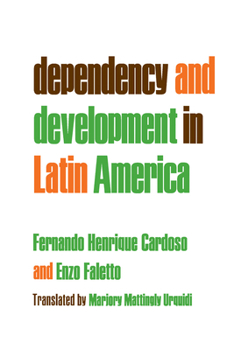Dependency and Development in Latin America
Select Format
Select Condition 
Book Overview
At the end of World War II, several Latin American countries seemed to be ready for industrialization and self-sustaining economic growth. Instead, they found that they had exchanged old forms of political and economic dependence for a new kind of dependency on the international capitalism of multinational corporations. In the much-acclaimed original Spanish edition ( Dependencia y Desarrollo en Am rica Latina ) and now in the expanded and revised English version, Cardoso and Faletto offer a sophisticated analysis of the economic development of Latin America. The economic dependency of Latin America stems not merely from the domination of the world market over internal national and "enclave" economies, but also from the much more complex interact ion of economic drives, political structures, social movements, and historically conditioned alliances. While heeding the unique histories of individual nations, the authors discern four general stages in Latin America's economic development: the early outward expansion of newly independent nations, the political emergence of the middle sector, the formation of internal markets in response to population growth, and the new dependence on international markets. In a postscript for this edition, Cardoso and Faletto examine the political, social and economic changes of the past ten years in light of their original hypotheses.
Format:Paperback
Language:English
ISBN:0520035275
ISBN13:9780520035270
Release Date:March 1979
Publisher:University of California Press
Length:227 Pages
Weight:0.82 lbs.
Dimensions:0.6" x 5.5" x 8.2"
Customer Reviews
1 rating
Landmark of dependency movement
Published by Thriftbooks.com User , 22 years ago
This book serves as one fo the main texts representing the (now defunct) dependency movement that hit Latin America in the 60s and 70s. Fernando Henrique Cardoso, one of the authors who later became president of Brazil, changed his posture and ended up becoming one of the strongest supporters of orthodox economic policy. This book is important in the history fo economic thought in Latin America, but one should not forget the context in which it was written and it may be a good idea to read it in conjunction with the many works that have been written since on the fallacies of thought in the dependency movement.






